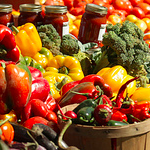Sustainable Restaurants: CFIA Responds to Labelling Strife with Interim Policy Updating “Local” Definition
Posted: May 15, 2013
Categories: Food in the News / Food in the News / GoodFoodBites / News from Sustain Ontario
As of Friday, May 10th, 2013, Canadians from coast to coast can suddenly choose from more “local” food options since the Canadian Food Inspection Agency (CFIA) announced an interim policy on its website in an effort to “modernize its food labeling approach.” The shift marks CFIA’s recognition of an “approach that is outdated,” having originated back in 1974, which “does not reflect current food production practices or consumer needs and expectations.” The CFIA’s previous policy had restricted the use of the terms “local” or “locally grown” to food originating within a 50 km radius of the place where it was sold, or food originating from within the same local government unit or adjacent government unit.
The following few weeks will involve a review of food labelling regulations, guidelines and policies including claims such as “local,” with input from consumers, industry and other stakeholders. Meanwhile, claims such as “local” and related qualifiers will remain voluntary and subject to regulations outlined in the Food and Drugs Act and the Consumer Packaging and Labelling Act, but may for now go so far as to include:
– “food produced in the province or territory in which it is sold,” or
– “food sold across provincial borders within 50 km of the originating province or territory”
The current approach is recognized to be broad and open for a range of uses, and its instantaneous applicability will serve to smooth over recent strife over labeling regulations at restaurants. Food connects us all, and the definition of “local” as a food label has significant implications for the daily work and future directions of members across Sustain Ontario’s alliance for healthy food and farming.
Earlier this year, the Sustainable Restaurants Working Group formed with the goal of helping to make it easier for restaurant owners and managers, operating on a variety of scales, to connect to farms and distributors in Ontario. We consider the Sustainable Restaurants Working Group to be an entry point for multi-stakeholder collaboration and cooperation wherein the diverse views of members concerned with setting the stage for more sustainable restaurants can be shared. While the wide range of perspectives involved in the new working group is not yet prepared to take on a single voice for sustainable restaurants, we recognize our work pivots around practices and policies that support use of “local” food.
At Bring Food Home, the Sustainable Restaurants Working Group will present a “Top 10” panel about promising initiatives and ideas, as well as discuss issues that require focused attention and resources to move forward together. We’ll also support learning and linking of farms to “foodies” of all sorts at the conference’s Feast.
If you are interested in being involved or know someone who should be please contact Vanessa Ling Yu.
2 responses to “Sustainable Restaurants: CFIA Responds to Labelling Strife with Interim Policy Updating “Local” Definition”
Leave a Reply
You must be logged in to post a comment.


Anything that supports fresher, healthier food is to be supported. Keep up the good work. We are what we eat and if you look at the average Canadian’s diet that adage becomes scary…
Thanks for your support, Agnes! I think the conversation needs to continue beyond who we are (what we eat), to how we are working together to eat fresher, healthier food in sustainable ways.
Here’s another great article with a call for more conversation by Abra Brynne of Food Secure Canada: http://foodsecurecanada.org/blog/brynne-abra/local-whats-word
Vanessa